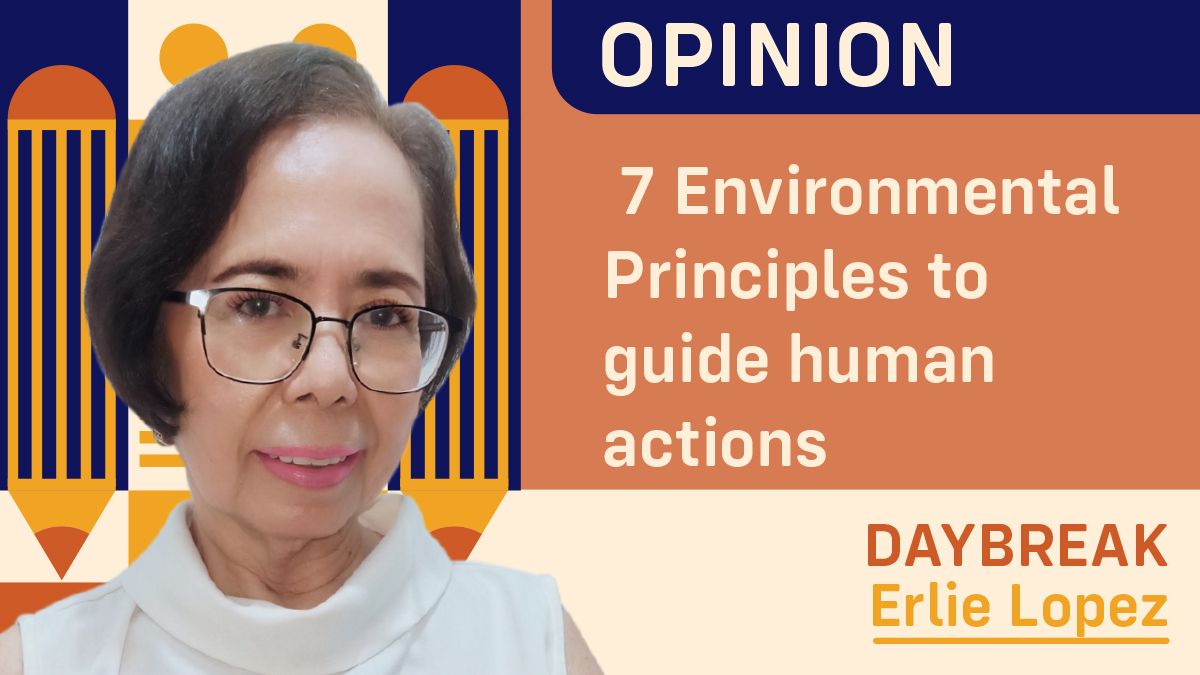There are 7 environmental principles that are taught in environmental study classes in the country as well as in events that gather like-minded advocates from various sectors mostly academe, government, non-government, business, and religious. The disturbing, even frightening state of our planet now inclusive of its components makes it however ideal that the rest of society get to be familiar with them, and at best, be grounded likewise on the same truths. This can help shape a better way to live, one that is in harmony with Nature which is the heart of the environment.
Dr. Angelina P. Galang, a long-time environmental science educator in Miriam College’s undergraduate and graduate programs, former executive director of the Environmental Studies Institute of the college, and one of the pillars of the environment movement, usually premises her lectures on the 7 environmental principles the institution framed under her leadership. I was fortunate to have been her graduate school student and to be maintaining ties with her through the Green Convergence for Safe Food, Healthy Environment and Sustainable Economy coalition (GC) she co-founded in 2007. In a recent meeting, she put a new shine to this landmark paper as a preface to a current training program of the Ako and Bukas movement convened by GC four years ago to address the urgent global issue of climate change. The program is on the use of a particular calculator to measure then reduce the carbon footprints of individuals, households, and entities like corporations as their contribution to mitigating global warming.
Overview of 7 EPs
In a nutshell, the 7 Environmental Principles are: 1. Nature knows best, 2. All forms of life are important, 3. Everything is connected to everything else, 4. Everything changes, 5. Ours is a finite earth, 6. Everything must go somewhere, and 7. Nature is beautiful and we are the stewards of God’s creation.
The 7 EPs, Dr. Galang asserts, are significant in that “they explain environmental issues, point to solutions to these issues, and guide future action and promote resiliency”. EP #1, for example, shows the problem of humans having strayed further and further from nature as with heavy use of plastics which are not recognized by decomposers and thus remain as waste in landfills and underneath oceans killing marine life. EP #5 which reminds us that our earth is finite should encourage us to conserve resources and value biodiversity. EP #7 is on earth stewardship that is caring and honoring the Creator, as Pope Francis also espouses, instead of being dominant species or just out of kinship with Nature.
Ecological Options
The 7 EPs present options on how humans should interact with Nature, in big ways as in farming and industrial manufacturing, and in ordinary life as households and individuals. As a rule, choose Natural over artificial/synthetic. Organic farming, not chemical agriculture (using toxic fertilizers and pesticides) and genetic engineering of crops (GMOs). Natural renewable energy which is safe and sustainable, over nuclear power which is highly radioactive and destructive. Down to the most basic activity of eating (water over carbonated drinks, boiled banana over potato chips, homecooked meals instead of regular fast foods).
Ultimately, ours is the choice to make our common home more livable and sustainable. #
Erlie Lopez is a writer, poet, PR consultant, and environment advocate.
Contact: erlielopez@gmail.com
#WeTakeAStand #OpinYon #OpinYonColumn #ColumnbyErlieLopez #Daybreak

